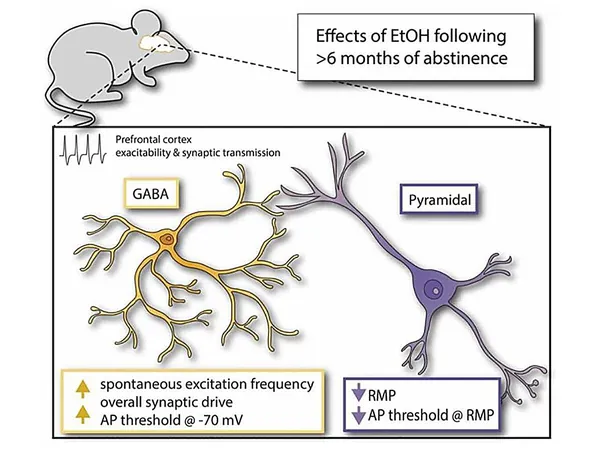
Shocking Study Reveals Lasting Effects of Early Adult Binge Drinking on Brain Aging in Mice!
2024-11-19
Author: Arjun
Introduction
A groundbreaking new study from Penn State has revealed that binge drinking during early adulthood can lead to significant, long-term alterations in brain function—with implications that may extend well into old age. The research, conducted with mice, demonstrates that the neural impacts of such drinking behaviors closely mirror changes typically associated with cognitive decline, raising alarms about potential future health issues like Alzheimer’s disease.
Study Overview
Published in the journal Neurobiology of Aging, the study highlights the worrying predictions regarding long-lasting damages stemming from alcohol abuse early in life. The research team, led by Nikki Crowley, director of the Penn State Neuroscience Institute, emphasizes that these findings could pave the way for therapies aimed at reversing brain damage caused by early binge drinking. "Our research indicates that even years after cessation of drinking, the brain can still bear the scars of those reckless behaviors," said Crowley.
Binge Drinking Experiment
Binge drinking, characterized by consuming excessive amounts of alcohol over short periods, typically occurs among young adults. The experimental setup involved allowing mice, approximately the equivalent of early 20-something humans, to indulge in a binge-drinking regimen that mirrored human drinking patterns—heavy drinking followed by periods of abstinence.
Research Findings
After being subjected to alcohol exposure for four weeks, and then abstaining until they reached middle age, the mice were analyzed for changes in brain cell function. Utilizing a sophisticated technique called whole-cell patch-clamp electrophysiology, researchers examined the activity of specific neuron types, including pyramidal and GABAergic neurons.
Long-term Effects on Neurons
Remarkably, the study's findings show that alterations in the brain persisted even after the mice had refrained from drinking for six months—an equivalently significant duration in human years. The pyramidal neurons, crucial for communication between brain regions, exhibited reduced excitability, making it more challenging for them to relay messages. "This change can be likened to needing to press harder on the gas pedal to get a car moving," Crowley explained. Meanwhile, GABAergic neurons—the brain’s inhibitory regulators—demonstrated an increase in excitatory drive, indicating a disruption in the delicate balance necessary for effective cognitive functioning.
Implications for Cognitive Health
These anomalies in neural communication resemble the hyperexcitability often observed in age-related cognitive decline, suggesting a potential link between early binge drinking and the onset of neurodegenerative diseases. "Even after an extended period of sobriety, the brain continues to show signs of dysregulation related to early alcohol consumption," Crowley noted.
Future Research Directions
Moving forward, Crowley’s team is excited about exploring therapeutic options that might restore the lost regulatory functions of the brain, potentially utilizing compounds such as somatostatin, which aids neuron communication. With the alarming implications of this study, it’s clear that awareness about binge drinking’s effects on health should extend far beyond immediate consequences—emphasizing the importance of responsible drinking in young adulthood to protect long-term cognitive health.
Conclusion
As the research continues, we may find new pathways to mitigate the impacts of past drinking behavior, offering hope for those who have struggled with alcohol. It begs the question: How many young adults are putting their future brain health at risk?


 Brasil (PT)
Brasil (PT)
 Canada (EN)
Canada (EN)
 Chile (ES)
Chile (ES)
 España (ES)
España (ES)
 France (FR)
France (FR)
 Hong Kong (EN)
Hong Kong (EN)
 Italia (IT)
Italia (IT)
 日本 (JA)
日本 (JA)
 Magyarország (HU)
Magyarország (HU)
 Norge (NO)
Norge (NO)
 Polska (PL)
Polska (PL)
 Schweiz (DE)
Schweiz (DE)
 Singapore (EN)
Singapore (EN)
 Sverige (SV)
Sverige (SV)
 Suomi (FI)
Suomi (FI)
 Türkiye (TR)
Türkiye (TR)